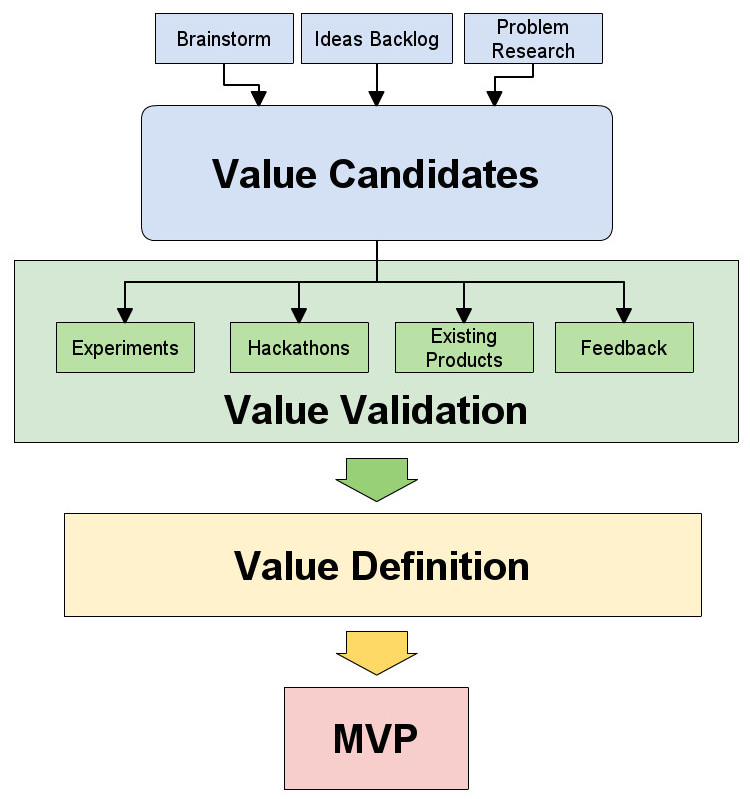In the search of value
Value is an interesting concept. Everyone talks about it, and everyone says it's the make it or break it for a business. But... how do you find it?
The secret ingredients
So, according to previous experiences, there are two secret ingredients for a project to be successful: Value and Discovery.
Discovery is easy to understand. You should leverage your marketing budget, your existing connections and your creativity in order to make as big an impact as possible. Not only that, but the product should lend itself to organic growth, and if possible, have built-in sharing and spreading mechanisms. Please note that I am saying it's easy to understand, that doesn't mean it's easy to achieve. In my case, the Google Play Appstore, doesn't seem to be a good platform for discovery:
I wonder how the heck does appstore search work when searching for "Quick Pick" you get Booking as a second result... pic.twitter.com/wE66kzI4xi
— Noel De Martín (@NoelDeMartin) marzo 17, 2015Basically, almost no users will find your application using Appstore search unless you already have a good user base. So you have to get them elsewhere.
Value, on the other hand, is more tricky. What is value? I like wikipedia's description of the concept:
Value is the difference between a prospective customer's evaluation of the benefits and costs of one product when compared with others
But it still doesn't fully explain it. Value is the single most important property of any product. It is what makes it special and the main reason why users should want it. Put simply, it is what makes a business work.
In the search of value
Personally I have always been aware of this concept of Value. But whenever I really think about it, it's so difficult to achieve.
Here's the situation: you hear about the wonders (and hustles) of entrepreneurship, you believe in that and you believe in yourself, so you decide to finally go for it, and build your thing. You know it won't work soon, you know it will take months or years (or maybe never). But the idea behind that, what keeps you going, is following your believes and working in something to make the world better. If you work hard, it will eventually pay off.
But, once you're sold on the idea and you decide to take the step, reality hits, and you ask yourself “What should I build?”. The answer is something that solves a problem, something that will really help its users, … something of value. And there we go again, what is value?
So far I haven't really faced this important issue, because my first projects with Lincoln's Chilli have been games (Quick Pick and Brain Duels), and the value in games is relatively simple and straightforward: having fun, prevent boredom, socialize, etc. Now I will face this head on, and really try to find something I am proud of building and something which is solving a problem.
And that's what I'd like to present in this post, my way of searching for value: The value pipeline.
The value pipeline

The value pipeline is a process I will follow in order to find something worth building, something of value, and I hope it can help someone who is in a similar situation. It is designed to maximize the real value created without wasting too many resources and going to deep in any particular idea. I've divided this process in 4 stages. Up until now my process had been jumping directly from stage 1 to stage 4 (Idea → MVP). So let's change that.
Stage 1: Value Candidates
This first stage is the starting point in the search for value. There are different ways of looking for something that could potentially be valuable. And it doesn't only include brainstorming and looking for ideas. It also includes investigation and research. The final output in this stage (which will be the input for the next stage) is a ton of “possible projects”, or put more bluntly, ideas. I call these Value Candidates. They should be generated using the following techniques:
-
Brainstorming: Doing brainstorms at regular intervals. Not only when “it's time to start something new”, but keeping a habit of brainstorming every two weeks or once a month. Too many brainstorms are bad because you start to repeat yourself, but too few and some amazing ideas will be kept burried. For this particular scenario I recommend to do themed brainstorms, trying to find a different source of inspiration for each session. Some that worked for me to start off are Chris Guillebeau's convergence or thinking what you're committed to.
-
Ideas Backlog: You should already have an ideas backlog. If you don't have it, start right now. An ideas backlog is something very simple. Every time you have an idea for a product, write it in your ideas backlog and forget about it. From time to time, review this backlog and discard whatever you think is not that good or not applicable anymore. Don't worry if this backlog grows big (I have 85 ideas right now!), that's normal and doesn't harm because you'll review this very sparingly.
-
Problem Research: A good way of finding problems to solve... is to look for problems! There are many places where you can find people trying to have problems solved: Google, Yahoo Answers, etc. Another way is not to solve problems, but to reframe existing problems from a different point of view. And finally, ask people! Ask you friends and family what problems they have which technology could help them solve, you may be surprised.
Stage 2: Value Validation
From the previous stage, we should now have a ton of ideas and problems to solve. Now, this next stage is very important (if not the most important). These should be validated as real problems, and also, our solution should be validated to really solve this problems. Each value candidate should pass at least one of the following filters (if not all of them!).
-
Experiments: I guess the more traditional term for this is a prototype. But I like to call them experiments for two reasons. First, because that's the name of the section on my website where I will place them (ha!). And second, because they should be completely and 100% experimental. Some times, prototypes can be confused with MVPs, but at this stage that shouldn't even matter. The only goal here is to test if a problem is solved properly as soon as possible (and wasting as little resources as possible), without thinking about viability.
-
Hackathons: I think hackathons are a great way of testing an idea. Of course, you should go to a hackathon in order to win, but if you also want to test an idea, this way you can win even if you lose, because you would have tested your idea. Hackathons are also great to give you a good focus and work a lot in an idea in a relatively small amount of time (and who knows, you may even start recruiting for the team to build the real thing!).
-
Existing products: This is so obvious, but yet so many people forget to do it. Search for existing solutions to what you're trying to solve. And this doesn't mean a quick search in Google. Really, spend some time trying to solve the problem with existing tools (maybe some products are not advertised to solve a problem but they do it quite well; don't underestimate spreadsheets!).
-
Feedback: Also so obvious, but people wait too much for this. Start asking for feedback as soon as possible, don't wait until you have already wasted resources. One of the best ways to validate an idea, is to get real customers before you build anything. If someone is interested in your product, that's the best feedback you can get. As well as simply asking for feedback, try to use some techniques to make sure the idea is explained correctly, like story telling, or have them explain what they understand of the problem, not the solution. And finally, the good old technique to surveying some people.
Stage 3: Value Definition
If some value candidates have gotten to this place, that should mean they are promising enough to start thinking about them as a real product. Here's when we should really start to think where most people start, and not sooner. Make a business case (product lifecycle, customer acquisition plan, monetization, etc.) and define what the real product (not prototype) should be. Start looking for the resources you will need, like the team and costs that will need to be covered, and there you go, start a new project!
Stage 4: MVP
Here's when the “work hard and in months or years it will pay off” begins. Even if something is really valuable, it doesn't mean it will succeed from the start. There are thousand of reasons why it may not work: you lack discovery, the market is not ready, the MVP doesn't reflect the value correctly, etc. But at least you know you are finally working in something of value.
